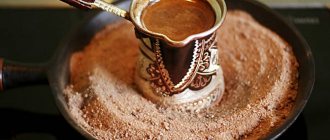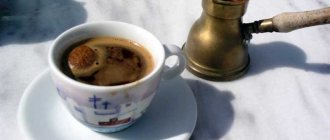Turkish coffee is undoubtedly one of the oldest drinks in the world, having occupied an important place in Turkish culture and has been preserved since the Ottoman Empire.
In 1543, the governor of Yemen, Ozdemir Pasha, brought coffee to Istanbul, which he admired.
And the Turks came up with a new method of preparing it, which became known as Turkish coffee or Turkish Coffee.
People learned about coffee thanks to coffee shops that opened in Tahtakal in Istanbul in 1554 and quickly spread throughout the city. Coffee, which occupies an important place in the Sultan's palace and homes, began to be consumed in large quantities.
In a short time, the taste and reputation of Turkish coffee spread throughout Europe and then the whole world, thanks to traders and travelers as well as ambassadors from the Ottoman Empire.
Kurukahveci Mehmet Efendi first introduced the coffee, which he roasted and first ground in his mill, for public consumption in 1871.
Turkish coffee is not only enjoyed by Turks, but also people from different cultures prefer it because of its delicious aroma and long-lasting taste in the mouth.
Turkish coffee making kit
Turkish coffee is usually prepared in 4 ways . Before preparing it, a cafe visitor is usually asked what kind of coffee he drinks.
No sugar is added to regular Turkish coffee. They also prepare coffee of less sweetness, to which 1 teaspoon of sugar is added, medium sweetness - with 2, sweet coffee - with 3 teaspoons of sugar.
To make good Turkish coffee, you first need to have the right tools and materials. A porcelain cup with a widened bottom and a narrowed top with a thick wall, finely ground Turkish coffee, and high-quality water are the most necessary tools when preparing Turkish coffee.
You also need the following equipment to prepare Turkish coffee:
- Turkish coffee can be prepared in a cezve (on the sand or on the stove)
- Turkish coffee can be prepared in an electric cezve
- Turkish coffee can be prepared in an electrically heated sand device, a kind of sand coffee maker.
- Turkish coffee can be prepared in a coffee machine
- A coffee grinder is also needed if ground coffee is not available.
To ensure foamy coffee, you need to choose the right size cezve. That's why a well-equipped Turkish kitchen comes with coffee pots that range in size from 1 to 4 cups.
Does coffee grow in Turkey?
The Republic of Turkey is not among the countries that grow coffee trees. Nevertheless, this drink (along with tea) is so popular in the country that it is considered part of the national culture, an indispensable attribute of special events, business meetings and family feasts.
Local supply companies offer a wide selection of different types of drink.
The first place is occupied by Turkish coffee beans, which are brewed in a traditional cezve with the addition of:
- cognac;
- nuts;
- spices;
- honey;
- fruit juice.
The drink first appeared in the Ottoman Empire in the 16th century.
There are different versions about this event:
- The fruits of the coffee tree were brought to Turkey by Syrian travelers.
- The drink was first served to Suleiman the Magnificent, who paid a visit to Yemen, which at that time was part of the huge Ottoman state.
In the first years after its appearance in the country, coffee was considered a privilege of the nobility. Later, the “invigorating elixir” began to spread throughout society, winning the love of the local population.
The Turkish climate is not entirely suitable for growing coffee trees. Historically, raw materials were imported from Arab countries. Now coffee beans are an important import item for the country. The Republic of Turkey has entered into agreements for the supply of raw materials with many global manufacturers.
PAGES OF HISTORY
It’s surprising, but the whole world calls brewed coffee made from roasted beans “Turkish,” despite the fact that coffee never grew in Turkey. Even local husbands tell their wives: “Dzhanim (dear), make me a cup of Turkish coffee.” Like, for example, if in Ryazan they asked to cook “Russian pancakes” or in Lvov - “Ukrainian donuts”. And although the name “Turkish” can most likely be attributed to the method of preparing coffee, such worldwide recognition is not at all accidental. There is so much joy associated with this drink in Turkish history.
and sadness that no one understands it better than the Turks, who say: “Coffee should be black as hell, strong as death, sweet as love.” Drinking coffee in Turkey after a meal, first time
definitely in the morning, but not at breakfast. By the way, even the name of breakfast kahvalti (“kahvalty”) literally means “before coffee.”
Since the 13th century, the green fruits of coffee were chewed by the natives of Ethiopia, which gave warriors amazing endurance, and Yemen, with its fertile soil and favorable climate, became the real homeland of coffee. How did coffee become “Turkish”?
In the 15th century, soldiers of the Ottoman Empire conquered Yemen, and its governor, vizier Ezdimir Pasha, brought green and fragrant fried fruits as a gift to the Sultan of Istanbul.
Sultan Suleiman the Magnificent becomes a passionate coffee drinker, and under his rule coffee gains real popularity in Turkey. In the Topkapi kitchen, a special position is established - a coffee maker (kahvecibasi), and for ease of preparation, a small ladle with a long handle called a cezva (Turk) is created, which we know and use to this day.
Turkish coffee with orange flavor
- hot strained Turkish coffee - 125 ml
- cognac – 30 ml
- finely grated orange zest - a pinch
- whipped cream - 1 cm. Spoon
By decree of the Sultan, the world's first coffee shop, “The Throne and Fortress,” was opened in Istanbul in 1554. Currently, one of the best and most expensive coffee shops in Istanbul, the “Mecca” of Turkish coffee lovers, Kurukahveci Mehmed Efendi, is located on almost the same site.
Coffee in those days became so widespread in the East that the Islamic clergy, seeing how believers spent more time in coffee shops than in churches praying, cursed this drink in the name of the Prophet.
In Mecca in 1511, a decree was issued prohibiting the consumption of coffee anywhere, and promising severe punishment to anyone who dared disobey. But, despite the prohibitions, coffee was drunk in literally every home in Turkey.
In the 16th century, the coffee addiction that spread in Turkey began to seriously worry the authorities, who believed that coffee “loosen tongues,” and unwanted conversations about politics were heard from every coffee shop. During the reign of Sultan Mohammed IV, sophisticated executions were invented for coffee lovers.
Coffee shops were closed, coffee became illegal, and coffee drinkers were executed by being sewn into coffee bags and thrown into the sea. Each time, after such decrees and reprisals from the authorities, uprisings broke out, which resulted in the abolition of all bans on coffee. So in Turkey, this drink has come a long and difficult path to its further recognition throughout the world.
Over time, scientists, teachers, writers, public figures began to gather in coffee houses, and heated discussions certainly took place over a cup of “Turk Kahvesi”. Such gatherings began to be called “Mekgab-i-Irfan” - “Schools of Educated People”.
Coffee became the drink of warriors and philosophers, the former giving strength in battles, and the latter - wisdom and prudence. In wealthy Turkish families, special servants appeared whose concern was exclusively preparing coffee and serving the masters during coffee ceremonies.
Since the Ottoman Empire, coffee has become part of the country's rituals, and is still inextricably linked with the culture of Turkey today. Since ancient times, every potential bride and groom have been tested on their ability to make real coffee; this has practically become a guarantee that the woman will get married successfully.
There are known cases when future brides added salt to coffee instead of sugar in order to avoid an unwanted marriage by conspiracy of their parents. Some modern girls can do the same, but with the goal of testing their chosen one for scandalousness and restraint. Moreover, the amount and durability of the foam reflects the degree of respect for the guests and love for the groom.
Of course, this is just a tribute to tradition, but even modern young people will definitely pay attention to how tasty the coffee the girl prepares is. And now in Turkey, many people believe that the more you love the person for whom you are brewing coffee, the more coffee foam should be in his cup.
Coffee "Oflameron" (recipe 1901)
- 1 teaspoon coffee
- 1 cm. spoon of semi-dry champagne
- 100 ml water
- 1 pinch vanilla
Thickly dilute vanilla in a small amount of water. Pour water into the Turk. Dip a teaspoon into the vanilla mixture and immediately take the coffee with it. Cook over moderate heat. Immediately after the foam forms, add champagne to the coffee. Cook until thick foam forms
What types of coffee are there in Turkey?
Coffee products in Turkey can be found in every supermarket. In all cities of the country there are stores specializing in the sale of this product.
The main rule for preparing real Turkish coffee is to use Arabica beans, finely ground and moderately roasted. Coffee can be bought in Turkey almost on every corner: in small shops, large supermarkets and in specialized shops. On the shelves there are options from the strongest to caffeine-free mixtures, as well as with various flavoring additives.
Turks also pay attention to other types of coffee:
- Soluble . It is represented by a variety of brands, the most popular of which are “Jacobs” and “Nescafe”. The drink made from such raw materials is not strong. Many people call it “female” or “childish”.
- Ground coffee almost ready for brewing. The grains do not need to be crushed; it is enough to prepare the drink in a traditional cezve.
- Ottoman coffee stands out in a separate group. When brewing a hot drink, milk, sugar, and aromatic spices are added.
Be sure to read: How to brew Turkish tea correctly: secrets, step-by-step instructions on how to drink the drink
DATA
- Coffee is the most popular drink in the world
- About 400 billion cups are drunk annually
- Coffee is grown in 45 countries around the world
- Brazil is the largest coffee producer
- One kilogram of Arabica coffee requires about 8,000 beans
- All beans are collected by hand
- Arabs began growing coffee trees in the 14th century.
- In 1657, coffee was promoted in Britain as a cure for scurvy and gout.
- Lemon has been added to coffee for several hundred years, much earlier than sugar.
- King Louis XIV of France was the first to add sugar to coffee in 1715.
- Beethoven was so scrupulous in his choice of coffee that he counted 60 beans each time he brewed it.
- Voltaire drank up to 50 cups of coffee a day
- Over the past 300 years, 90% of the Western population has switched from tea to coffee
- Today there are more than 400 thousand coffee shops in Turkey
Turkish coffee: popular brands
The country's climate is not suitable for growing coffee plants. Despite this, there is a wide range of coffee on supermarket shelves. There are various types on sale, but coffee beans remain the favorite.
| brand | description |
| Kurukahveci Mehmet Efendi | The company began operating in the 19th century. Now the factories use the latest developments and technologies. Many years of production experience are also taken into account. Mehmet Efendi produces products from finely ground beans, which produce strong aromatic coffee. A package weighing 100 g will cost 5-6 liras (or 55-65 rubles). |
| Hisar Kahve 1928 | The corporation, founded in the first half of the 20th century, produces coffee products using modern equipment. The use of the latest technological developments in production, combined with the experience accumulated over a century of operation of the company, helps to produce high-quality products. The price of the product (per 100 g) is 5-7 liras. This is 55-78 rubles. |
| Cezbeli Kahve | The company is based in Istanbul. Produces instant coffee. Selected Arabica beans are used for production. A package weighing 100 g costs 5 liras (55-58 Russian rubles). |
| Kahve Dunya Türk Kahvesi | A manufacturer operating in the Turkish coffee market since 2004. It supplies ground and instant coffee to stores across the country, and also exports goods to foreign countries (Kuwait, Saudi Arabia, Romania). 100 g of raw materials costs from 5 to 7 liras (from 55 to 78 rubles). |
| Ulker Cafe Grown | The Ülker company, traditionally engaged in the production of chocolate products, produces different types of instant coffee:
The cost is 50 kurus per bag (portioned). Translated into Russian money, this is 5-6 rubles. |
| Nurettin Kocatepe Türk Kahvesi | The Kocatepe company began operations in 1948. The company produces coffee beans. The raw materials are characterized by a high degree of roasting. However, this does not affect the taste of the finished drink, which remains soft, without the slightest sign of bitterness. 100 g of raw materials costs 6-7 Turkish liras (66-78 rubles). |
Useful tips
It is considered bad taste to pour and stir sugar into a cup of Turkish coffee. Therefore, any local coffee shop and even a simple cafe will definitely specify the amount of sugar that the client prefers.
Coffee without sugar is called “sade”.
With a little added sugar (1 cube) - “az sekerli”.
Medium sweetness (2 cubes) - “orta sekerli”.
Sweet coffee (3 cubes) - “chok sekerli” (cok sekerli).
If you want to buy coffee beans with you, ask for unground coffee (in beans) - “cekirdek kahve”.
It is worth considering that refusing coffee offered by the owner can be taken as an insult in many Turkish homes.
Turkish coffee with egg yolk
- Brew classic Turkish coffee.
- Let him settle.
- Yolk - 1 pc.
Beat the yolk, but not until foamy. First pour the egg yolk into a cup scalded with boiling water, then the coffee. The drink can be served both cold and hot.
Turkish coffee beans: which one is better?
Turkish manufacturing enterprises supply the local market with a wide range of products containing Robusta or Arabica beans. Arabica is in greatest demand in Turkey. It is believed that a drink made from Arabica beans tastes better and also has a brighter aroma.
When purchasing products, you need to pay attention to the labels on the packaging. The percentage of raw material quality (100% Arabica) must be indicated there. According to the Turks, only from such a product can a real aromatic “elixir” be prepared.
The country of origin of the grains is also important. Products grown in Brazil are in demand. In addition, such products have a relatively low cost.
What is the best ground coffee in Turkey?
Modern Turks often buy freeze-dried coffee. Despite this, ground coffee ranks first in the list of sales leaders.
Brands sold include:
- Kurukahveci Mehmet Efendi;
- Abdullah Efendi Türk Kahvesi;
- Orta Kavrulmuş Türk Kahvesi.
“Mehmet Efendi” is in first place in sales. This product is purchased by Turks to prepare treats at home. Tourists do not ignore the popular brand either, purchasing the product and bringing it back home as a souvenir.











